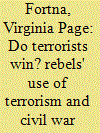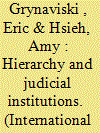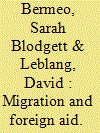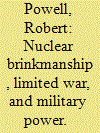|
|
|
Sort Order |
|
|
|
Items / Page
|
|
|
|
|
|
|
| Srl | Item |
| 1 |
ID:
140355


|
|
|
|
|
| Summary/Abstract |
Common wisdom and current scholarship hold that governments need to stand firm in the face of secessionist demands, since permitting the secession of one region can set a precedent for others. For this reason governments will often choose blood rather than risk dissolution. I argue that administrative organization provides states with a third option. Those regions that represent a unique administrative type stand a much better chance of seceding peacefully. Moreover, large articulated states sometimes downsize by administrative category, which helps explain why governments will release one set of units without contest while preventing another set from doing the same. Finally, secessionist movements that do not cohere with any administrative region are the least likely to be granted independence. In sum, the administrative architecture of states provides governments with a means to discriminate between secessionist demands. I test this theory in a large-N study using original data on secessionist movements and administrative units between 1816 and 2011.
|
|
|
|
|
|
|
|
|
|
|
|
|
|
|
|
| 2 |
ID:
140349


|
|
|
|
|
| Summary/Abstract |
How effective is terrorism? This question has generated lively scholarly debate and is of obvious importance to policy-makers. However, most existing studies of terrorism are not well equipped to answer this question because they lack an appropriate comparison. This article compares the outcomes of civil wars to assess whether rebel groups that use terrorism fare better than those who eschew this tactic. I evaluate the advantages and disadvantages of terrorism relative to other tactics used in civil war. Because terrorism is not a tactic employed at random, I first briefly explore empirically which groups use terrorism. Controlling for factors that may affect both the use of terrorism and war outcomes, I find that although civil wars involving terrorism last longer than other wars, terrorist rebel groups are generally less likely to achieve their larger political objectives than are nonterrorist groups. Terrorism may be less ineffective against democracies, but even in this context, terrorists do not win.
|
|
|
|
|
|
|
|
|
|
|
|
|
|
|
|
| 3 |
ID:
140350


|
|
|
|
|
| Summary/Abstract |
This paper blends recent research on hierarchy and democratization to examine the theoretical and empirical costs of treating regime type exogenously in the literature most identified with studying its impact on international politics. It argues that the apparent peace among democratic states that emerges in the aftermath of World War I is not caused by domestic institutional attributes normally associated with democracy. Instead, this peace is an artifact of historically specific great power settlements. These settlements shape subsequent aggregate patterns of military conflict by altering the organizational configuration of the system in three critical ways—by creating new states, by altering hierarchical orders, and by influencing regime type in states. These claims are defended with a series of tests that show first how the statistical relationship between democracy and peace has exhibited substantial variation across great power orders; second, that this statistical relationship breaks down with theoretically motivated research design changes; and third, that great powers foster peace and similar regime types within their hierarchical orders. In short, the relationship between democracy and peace is spurious. The international political order is still built and managed by great powers.
|
|
|
|
|
|
|
|
|
|
|
|
|
|
|
|
| 4 |
ID:
140354


|
|
|
|
|
| Summary/Abstract |
International arbitration is a distinctive feature of both contemporary international politics and the ancient world. Explanations of arbitration in the international relations literature generally posit that states engage in arbitration to mitigate the effects of competition in an anarchical system, or that the practice of arbitration reflects democratic norms. However, an examination of arbitration during the paradigmatic case of the Hellenistic period (338–90 bce) casts doubt on the existing literature. Hierarchy rather than anarchy better characterizes the political context in which arbitration took place: the Greeks often organized themselves into alliances or leagues in which a hegemon dominated decision making, or into federal states with a common foreign policy. This hierarchical setting was a necessary condition for international arbitration where the practice of arbitration was a tool to legitimize hierarchical powers. We assemble an original data set of Hellenistic arbitrations, and use qualitative comparative analysis to show that hierarchy was almost always a necessary condition for international arbitration. Process-tracing of arbitration under three political orders—hegemonic kingdoms in the Greek world, Greek federations, and the Roman Empire—shows that arbitration as a particular means of dispute resolution was used as an ideological device to build and legitimize international order. We then analyze the contemporary record, finding a role for hierarchy in modern international arbitration.
|
|
|
|
|
|
|
|
|
|
|
|
|
|
|
|
| 5 |
ID:
140353


|
|
|
|
|
| Summary/Abstract |
Status has long been implicated as a critical value of states and leaders in international politics. However, decades of research on the link between status and conflict have yielded divergent findings, and little evidence of a causal relationship. I attempt to resolve this impasse by shifting the focus from status to relative status concerns in building a theory of status from the ground up, beginning with its behavioral microfoundations. I build on and extend previous work through an experimental study of status threats and the escalation of commitment, operationalized here as a new behavioral escalation task using real financial incentives and framed around a narrative of war and peace. I utilize a unique sample of high-profile political and military leaders from the Senior Executive Fellow (SEF) program at the Harvard Kennedy School, as well as a group of demographically matched control subjects, allowing me to evaluate the moderating effect of power on status concerns while also addressing typical concerns about external validity in IR experiments. I find strong evidence that the fear of losing status impedes decision making and increases the tendency to “throw good money after bad,” but that power aids decision making by buffering high-power subjects against the worst effects of status loss.
|
|
|
|
|
|
|
|
|
|
|
|
|
|
|
|
| 6 |
ID:
140352


|
|
|
|
|
| Summary/Abstract |
When it comes to linkages between migration and the global allocation of foreign development assistance, the size of the immigrant population from a recipient country residing in a donor country is an important determinant of dyadic aid commitments. Two complementary hypotheses probe this relationship. First, donors use foreign aid to achieve their broader immigration goals, targeting migrant-sending areas to increase development and decrease the demand for entry into the donor country. Second, migrants already residing in the donor country mobilize to lobby for additional aid for their homeland. Empirical tests on a large sample of country pairs made up of twenty-two donors and more than 150 recipients over the period 1993 to 2008 show robust support for these hypotheses.
|
|
|
|
|
|
|
|
|
|
|
|
|
|
|
|
| 7 |
ID:
140351


|
|
|
|
|
| Summary/Abstract |
An open question in nuclear deterrence theory is whether and how the balance of military power affects the dynamics of escalation. The balance of military strength plays virtually no role in standard accounts of brinkmanship. But this is largely by assumption and seems incompatible with an apparent trade-off between power and risk that decision makers have faced in some actual crises. This paper incorporates this trade-off in a modified model of nuclear brinkmanship. A main result is that the more likely the balance of resolve is to favor a defender, the less military power a challenger brings to bear. The model also formalizes the stability-instability paradox, showing that a less stable strategic balance, that is, a sharper trade-off between power and risk, makes conflict at high levels of violence less likely but conflict at lower levels more likely. The analysis also helps explain the incentives different states have to adopt different nuclear doctrines and force postures.
|
|
|
|
|
|
|
|
|
|
|
|
|
|
|
|
|
|
|
|
|